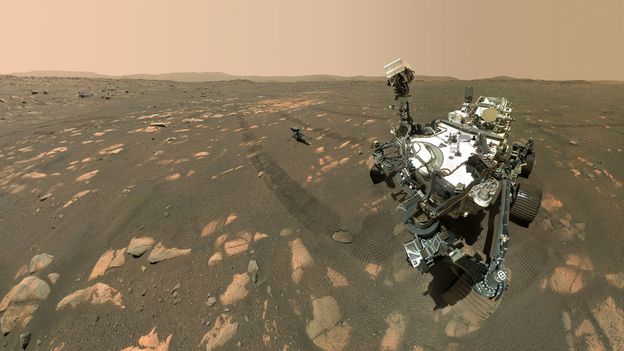
It turns out that clean rooms might serve as an evolutionary selection process for the hardiest bugs that then may have a greater chance of surviving a journey to Mars.
Microbes could potentially hitchhike their way to Mars, even after radiation and sterilisation procedures, and their genomes may change so much that they look truly otherworldly, as we have recently seen with microbes that evolved on the International Space Station.
Humankind has sent dozens of spacecraft and landers to Mars – those that have been successful have left their mark on the Red Planet (Credit: NASA/JPL-Caltech/MSSS).But when a Nasa and the European Space Agency mission is launched towards Mars in 2028, it could become a very real issue – if all goes according to current plans, the Mars Sample Return Mission will bring back the first Martian samples to Earth in 2032.
There is already a chance, however, that if we do detect signs of life on Mars, it could have come from Earth in the first place.Ever since the first two Soviet probes landed on the Martian surface in 1971, followed by the US Viking 1 lander in 1976, there likely have been some fragments of microbial, and maybe human DNA, on the Red Planet.
But even if Perseverance – or the missions that preceded it – did accidentally carry organisms or DNA from Earth to Mars, we have ways of telling it apart from any life that is truly Martian in origin.By comparing any DNA found on Mars to sequences seen in the clean rooms of JPL, the subways of the world, clinical samples, wastewater, or the surface of the Perseverance rover before it left Earth, it should be possible to see if they are truly novel.Even if our exploration of the Solar System has inadvertently carried microbes to other planets, it is likely they will not be the same as it was when it left the Earth.If an organism from Earth has adapted to space, or Mars, the genetics tools we have at our disposal could help us figure out how and why the microbes changed. .
They may even make life on Mars more tolerable for those who go there, since the unique genomes adapting to the Martian environment could be sequenced, transmitted back to Earth for further characterisation, and then utilised for therapeutics and research on both planets.